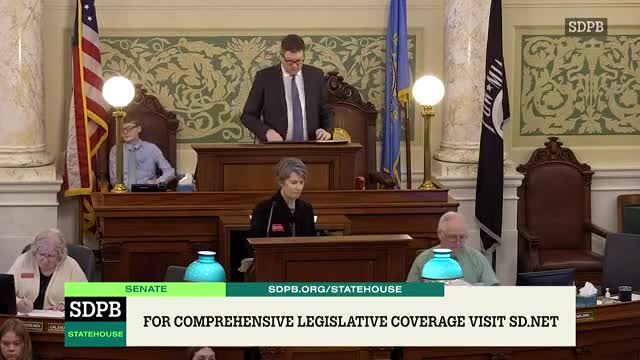Senate reclassifies ingestion offense, expands treatment pathway; SB83 narrowly passes
Get AI-powered insights, summaries, and transcripts
Subscribe
Summary
After extended floor debate about incarceration costs, treatment courts and community impacts, the Senate passed Senate Bill 83 to lower the penalty for ingestion and promote diversion/treatment options such as HOPE Probation.
The South Dakota Senate passed Senate Bill 83 after an extended floor discussion about whether lowering the penalty for ingestion of controlled substances would improve rehabilitation outcomes and reduce incarceration costs.
Senator Jessica Grove, the bill’s sponsor, said the measure would revise the penalty and increase treatment options for people who ingest certain controlled substances. Grove argued South Dakota is currently the only state that treats ingestion as a felony and urged lawmakers to prioritize treatment courts and probation options as alternatives to incarceration.
Supporters cited local treatment-court programs and HOPE Probation as successful models and said changing the penalty would allow earlier access to those diversion resources. Senator Smith said, “addiction is not a moral failing, it's an illness,” and urged giving people access to treatment rather than defaulting to incarceration.
Opponents warned that lowering the penalty could reduce deterrence and complicate law enforcement’s response to related crimes. Senator Duhamel said ingestion often accompanies other criminal activity and raised concerns that a misdemeanor penalty might not deter offenders who then commit property or violent offenses. Several state's attorneys, he reported, opposed the bill and urged caution.
Senator Grove and other backers cited Department of Corrections capacity constraints and treatment-resource requests before appropriations committees. During debate Grove clarified cost figures after a member questioned an earlier large-per-day number; she said the DOC figures she used yielded multi‑thousand-dollar annual cost estimates per inmate and that daily incarceration cost figures vary by source. The transcript records both the contested $33,601.90 per-day figure as presented and a committee-supplied clarification that incarceration costs are roughly $92 per day (and annual estimates of about $39,000–$43,000 by gender), with the differing numbers attributed in debate to different sources.
On final passage, the roll call produced 18 yeas and 17 nays; the president declared the bill passed by a majority of members elect.
The floor debate included multiple senators, questions for the sponsor, data on program graduation rates for HOPE Probation quoted from UJS, and references to DOC capacity and projected population growth in prison populations.
